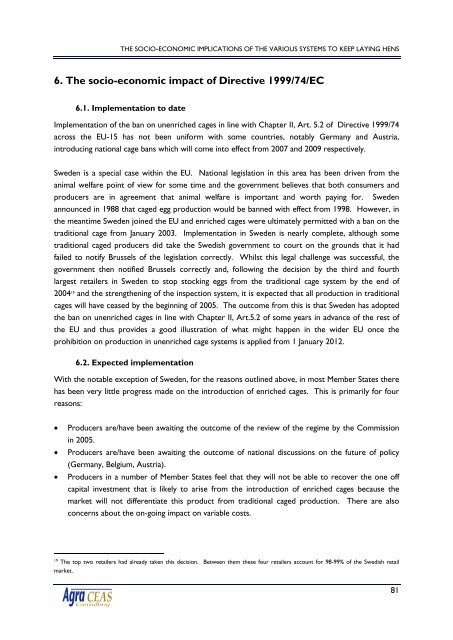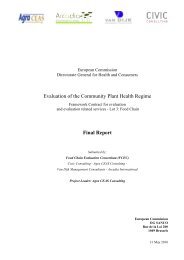- Page 1:
Study on thesocio-economic implicat
- Page 4 and 5:
THE SOCIO-ECONOMIC IMPLICATIONS OF
- Page 7 and 8:
THE SOCIO-ECONOMIC IMPLICATIONS OF
- Page 9:
THE SOCIO-ECONOMIC IMPLICATIONS OF
- Page 12 and 13:
THE SOCIO-ECONOMIC IMPLICATIONS OF
- Page 14 and 15:
THE SOCIO-ECONOMIC IMPLICATIONS OF
- Page 16 and 17:
THE SOCIO-ECONOMIC IMPLICATIONS OF
- Page 18 and 19:
THE SOCIO-ECONOMIC IMPLICATIONS OF
- Page 20 and 21:
THE SOCIO-ECONOMIC IMPLICATIONS OF
- Page 22 and 23:
THE SOCIO-ECONOMIC IMPLICATIONS OF
- Page 24 and 25:
THE SOCIO-ECONOMIC IMPLICATIONS OF
- Page 26 and 27:
THE SOCIO-ECONOMIC IMPLICATIONS OF
- Page 28 and 29:
THE SOCIO-ECONOMIC IMPLICATIONS OF
- Page 30 and 31:
THE SOCIO-ECONOMIC IMPLICATIONS OF
- Page 32 and 33:
THE SOCIO-ECONOMIC IMPLICATIONS OF
- Page 34 and 35:
THE SOCIO-ECONOMIC IMPLICATIONS OF
- Page 36 and 37:
THE SOCIO-ECONOMIC IMPLICATIONS OF
- Page 38 and 39:
THE SOCIO-ECONOMIC IMPLICATIONS OF
- Page 41 and 42: THE SOCIO-ECONOMIC IMPLICATIONS OF
- Page 43 and 44: THE SOCIO-ECONOMIC IMPLICATIONS OF
- Page 45 and 46: THE SOCIO-ECONOMIC IMPLICATIONS OF
- Page 47 and 48: THE SOCIO-ECONOMIC IMPLICATIONS OF
- Page 49 and 50: THE SOCIO-ECONOMIC IMPLICATIONS OF
- Page 51 and 52: THE SOCIO-ECONOMIC IMPLICATIONS OF
- Page 53 and 54: THE SOCIO-ECONOMIC IMPLICATIONS OF
- Page 55 and 56: THE SOCIO-ECONOMIC IMPLICATIONS OF
- Page 57 and 58: THE SOCIO-ECONOMIC IMPLICATIONS OF
- Page 59 and 60: THE SOCIO-ECONOMIC IMPLICATIONS OF
- Page 61 and 62: THE SOCIO-ECONOMIC IMPLICATIONS OF
- Page 63 and 64: THE SOCIO-ECONOMIC IMPLICATIONS OF
- Page 65 and 66: THE SOCIO-ECONOMIC IMPLICATIONS OF
- Page 67 and 68: THE SOCIO-ECONOMIC IMPLICATIONS OF
- Page 69 and 70: THE SOCIO-ECONOMIC IMPLICATIONS OF
- Page 71 and 72: THE SOCIO-ECONOMIC IMPLICATIONS OF
- Page 73: THE SOCIO-ECONOMIC IMPLICATIONS OF
- Page 76 and 77: THE SOCIO-ECONOMIC IMPLICATIONS OF
- Page 78 and 79: THE SOCIO-ECONOMIC IMPLICATIONS OF
- Page 80 and 81: THE SOCIO-ECONOMIC IMPLICATIONS OF
- Page 82 and 83: THE SOCIO-ECONOMIC IMPLICATIONS OF
- Page 84 and 85: THE SOCIO-ECONOMIC IMPLICATIONS OF
- Page 87 and 88: THE SOCIO-ECONOMIC IMPLICATIONS OF
- Page 89: THE SOCIO-ECONOMIC IMPLICATIONS OF
- Page 93 and 94: THE SOCIO-ECONOMIC IMPLICATIONS OF
- Page 95 and 96: THE SOCIO-ECONOMIC IMPLICATIONS OF
- Page 97 and 98: THE SOCIO-ECONOMIC IMPLICATIONS OF
- Page 99 and 100: THE SOCIO-ECONOMIC IMPLICATIONS OF
- Page 101 and 102: THE SOCIO-ECONOMIC IMPLICATIONS OF
- Page 103 and 104: THE SOCIO-ECONOMIC IMPLICATIONS OF
- Page 105 and 106: THE SOCIO-ECONOMIC IMPLICATIONS OF
- Page 107 and 108: THE SOCIO-ECONOMIC IMPLICATIONS OF
- Page 109 and 110: THE SOCIO-ECONOMIC IMPLICATIONS OF
- Page 111 and 112: THE SOCIO-ECONOMIC IMPLICATIONS OF
- Page 113 and 114: THE SOCIO-ECONOMIC IMPLICATIONS OF
- Page 115 and 116: THE SOCIO-ECONOMIC IMPLICATIONS OF
- Page 117 and 118: THE SOCIO-ECONOMIC IMPLICATIONS OF
- Page 119 and 120: THE SOCIO-ECONOMIC IMPLICATIONS OF
- Page 121 and 122: THE SOCIO-ECONOMIC IMPLICATIONS OF
- Page 123 and 124: THE SOCIO-ECONOMIC IMPLICATIONS OF
- Page 125 and 126: THE SOCIO-ECONOMIC IMPLICATIONS OF
- Page 127 and 128: THE SOCIO-ECONOMIC IMPLICATIONS OF
- Page 129 and 130: THE SOCIO-ECONOMIC IMPLICATIONS OF
- Page 131 and 132: THE SOCIO-ECONOMIC IMPLICATIONS OF
- Page 133 and 134: THE SOCIO-ECONOMIC IMPLICATIONS OF
- Page 135 and 136: THE SOCIO-ECONOMIC IMPLICATIONS OF
- Page 137 and 138: THE SOCIO-ECONOMIC IMPLICATIONS OF
- Page 139 and 140: THE SOCIO-ECONOMIC IMPLICATIONS OF
- Page 141 and 142:
THE SOCIO-ECONOMIC IMPLICATIONS OF
- Page 143 and 144:
THE SOCIO-ECONOMIC IMPLICATIONS OF
- Page 145 and 146:
THE SOCIO-ECONOMIC IMPLICATIONS OF
- Page 147 and 148:
THE SOCIO-ECONOMIC IMPLICATIONS OF
- Page 149 and 150:
THE SOCIO-ECONOMIC IMPLICATIONS OF
- Page 151 and 152:
THE SOCIO-ECONOMIC IMPLICATIONS OF
- Page 153:
THE SOCIO-ECONOMIC IMPLICATIONS OF
- Page 156 and 157:
THE SOCIO-ECONOMIC IMPLICATIONS OF
- Page 158 and 159:
THE SOCIO-ECONOMIC IMPLICATIONS OF
- Page 160 and 161:
THE SOCIO-ECONOMIC IMPLICATIONS OF
- Page 162 and 163:
THE SOCIO-ECONOMIC IMPLICATIONS OF
- Page 164 and 165:
THE SOCIO-ECONOMIC IMPLICATIONS OF
- Page 166 and 167:
THE SOCIO-ECONOMIC IMPLICATIONS OF
- Page 168 and 169:
THE SOCIO-ECONOMIC IMPLICATIONS OF
- Page 170 and 171:
THE SOCIO-ECONOMIC IMPLICATIONS OF
- Page 172 and 173:
THE SOCIO-ECONOMIC IMPLICATIONS OF
- Page 174 and 175:
THE SOCIO-ECONOMIC IMPLICATIONS OF
- Page 176 and 177:
THE SOCIO-ECONOMIC IMPLICATIONS OF
- Page 178 and 179:
THE SOCIO-ECONOMIC IMPLICATIONS OF
- Page 180 and 181:
THE SOCIO-ECONOMIC IMPLICATIONS OF
- Page 182 and 183:
THE SOCIO-ECONOMIC IMPLICATIONS OF
- Page 184 and 185:
THE SOCIO-ECONOMIC IMPLICATIONS OF
- Page 186 and 187:
THE SOCIO-ECONOMIC IMPLICATIONS OF
- Page 188 and 189:
THE SOCIO-ECONOMIC IMPLICATIONS OF
- Page 190 and 191:
THE SOCIO-ECONOMIC IMPLICATIONS OF
- Page 192 and 193:
THE SOCIO-ECONOMIC IMPLICATIONS OF
- Page 194 and 195:
THE SOCIO-ECONOMIC IMPLICATIONS OF
- Page 196 and 197:
THE SOCIO-ECONOMIC IMPLICATIONS OF
- Page 198 and 199:
THE SOCIO-ECONOMIC IMPLICATIONS OF
- Page 200 and 201:
THE SOCIO-ECONOMIC IMPLICATIONS OF
- Page 202 and 203:
APPENDIX 1: MEMBER STATE REPORTSIt
- Page 204 and 205:
APPENDIX 1: MEMBER STATE REPORTSAs
- Page 206 and 207:
APPENDIX 1: MEMBER STATE REPORTSBox
- Page 208 and 209:
APPENDIX 1: MEMBER STATE REPORTSTab
- Page 210 and 211:
APPENDIX 1: MEMBER STATE REPORTSOvo
- Page 212 and 213:
APPENDIX 1: MEMBER STATE REPORTSA1.
- Page 214 and 215:
APPENDIX 1: MEMBER STATE REPORTSCon
- Page 216 and 217:
APPENDIX 1: MEMBER STATE REPORTSHis
- Page 218 and 219:
APPENDIX 1: MEMBER STATE REPORTSA1.
- Page 220 and 221:
APPENDIX 1: MEMBER STATE REPORTS43N
- Page 222 and 223:
APPENDIX 1: MEMBER STATE REPORTS14,
- Page 224 and 225:
APPENDIX 1: MEMBER STATE REPORTSTab
- Page 226 and 227:
APPENDIX 1: MEMBER STATE REPORTSA1.
- Page 228 and 229:
APPENDIX 1: MEMBER STATE REPORTSA1.
- Page 230 and 231:
APPENDIX 1: MEMBER STATE REPORTSIta
- Page 232 and 233:
APPENDIX 1: MEMBER STATE REPORTSBox
- Page 234 and 235:
APPENDIX 1: MEMBER STATE REPORTS605
- Page 236 and 237:
APPENDIX 1: MEMBER STATE REPORTSA1.
- Page 238 and 239:
APPENDIX 1: MEMBER STATE REPORTSA1.
- Page 240 and 241:
APPENDIX 1: MEMBER STATE REPORTS35%
- Page 243 and 244:
APPENDIX 1: MEMBER STATE REPORTSA1.
- Page 245 and 246:
APPENDIX 1: MEMBER STATE REPORTSTab
- Page 247 and 248:
APPENDIX 1: MEMBER STATE REPORTSIn
- Page 249 and 250:
APPENDIX 1: MEMBER STATE REPORTSTab
- Page 251 and 252:
APPENDIX 1: MEMBER STATE REPORTS100
- Page 253 and 254:
APPENDIX 1: MEMBER STATE REPORTSA1.
- Page 255 and 256:
APPENDIX 1: MEMBER STATE REPORTSTab
- Page 257 and 258:
APPENDIX 1: MEMBER STATE REPORTSA1.
- Page 259 and 260:
APPENDIX 1: MEMBER STATE REPORTSTab
- Page 261 and 262:
APPENDIX 1: MEMBER STATE REPORTS160
- Page 263 and 264:
APPENDIX 1: MEMBER STATE REPORTSA 2
- Page 265 and 266:
APPENDIX 1: MEMBER STATE REPORTSA1.
- Page 267 and 268:
APPENDIX 1: MEMBER STATE REPORTSTab
- Page 269 and 270:
APPENDIX 1: MEMBER STATE REPORTSThe
- Page 271 and 272:
APPENDIX 1: MEMBER STATE REPORTSPol
- Page 273 and 274:
APPENDIX 1: MEMBER STATE REPORTSTab
- Page 275 and 276:
APPENDIX 1: MEMBER STATE REPORTSIn
- Page 277 and 278:
APPENDIX 1: MEMBER STATE REPORTSsta
- Page 279:
APPENDIX 1: MEMBER STATE REPORTSegg
- Page 282 and 283:
APPENDIX 1: MEMBER STATE REPORTSTab
- Page 284 and 285:
APPENDIX 1: MEMBER STATE REPORTSTab
- Page 286 and 287:
APPENDIX 1: MEMBER STATE REPORTSA1.
- Page 288 and 289:
APPENDIX 1: MEMBER STATE REPORTSBox
- Page 290 and 291:
APPENDIX 1: MEMBER STATE REPORTSA1.
- Page 292 and 293:
APPENDIX 1: MEMBER STATE REPORTSrec
- Page 294 and 295:
APPENDIX 1: MEMBER STATE REPORTSIn
- Page 296 and 297:
APPENDIX 1: MEMBER STATE REPORTSTec
- Page 298 and 299:
APPENDIX 1: MEMBER STATE REPORTSTab
- Page 300 and 301:
APPENDIX 1: MEMBER STATE REPORTSA1.
- Page 302 and 303:
APPENDIX 1: MEMBER STATE REPORTS140
- Page 305 and 306:
APPENDIX 1: MEMBER STATE REPORTSA1.
- Page 307 and 308:
APPENDIX 1: MEMBER STATE REPORTS70,
- Page 309 and 310:
APPENDIX 1: MEMBER STATE REPORTSBox
- Page 311 and 312:
APPENDIX 1: MEMBER STATE REPORTS100
- Page 313 and 314:
APPENDIX 1: MEMBER STATE REPORTSTab
- Page 315 and 316:
APPENDIX 1: MEMBER STATE REPORTSA1.
- Page 317 and 318:
APPENDIX 1: MEMBER STATE REPORTSA1.
- Page 319:
APPENDIX 1: MEMBER STATE REPORTSenr
- Page 322 and 323:
APPENDIX 1: MEMBER STATE REPORTS121
- Page 324 and 325:
APPENDIX 1: MEMBER STATE REPORTSThi
- Page 326 and 327:
APPENDIX 1: MEMBER STATE REPORTSBox
- Page 328 and 329:
APPENDIX 1: MEMBER STATE REPORTSTab
- Page 330 and 331:
APPENDIX 1: MEMBER STATE REPORTSThi
- Page 332 and 333:
APPENDIX 1: MEMBER STATE REPORTSlow
- Page 334 and 335:
APPENDIX 1: MEMBER STATE REPORTSA1.
- Page 336 and 337:
APPENDIX 1: MEMBER STATE REPORTSTab
- Page 338 and 339:
APPENDIX 1: MEMBER STATE REPORTS160
- Page 340 and 341:
APPENDIX 1: MEMBER STATE REPORTSThe
- Page 342 and 343:
APPENDIX 1: MEMBER STATE REPORTSTab
- Page 344 and 345:
APPENDIX 1: MEMBER STATE REPORTSAni
- Page 346 and 347:
APPENDIX 1: MEMBER STATE REPORTSAs
- Page 348 and 349:
APPENDIX 1: MEMBER STATE REPORTSpro
- Page 350 and 351:
APPENDIX 1: MEMBER STATE REPORTSTab
- Page 352 and 353:
APPENDIX 1: MEMBER STATE REPORTSYEA
- Page 354 and 355:
APPENDIX 1: MEMBER STATE REPORTSYEA
- Page 356 and 357:
APPENDIX 1: MEMBER STATE REPORTSYEA
- Page 358 and 359:
APPENDIX 1: MEMBER STATE REPORTSA2.
- Page 360 and 361:
APPENDIX 1: MEMBER STATE REPORTSA2.
- Page 363 and 364:
APPENDIX 1: MEMBER STATE REPORTSA2.
- Page 365 and 366:
APPENDIX 1: MEMBER STATE REPORTSMex
- Page 367 and 368:
APPENDIX 1: MEMBER STATE REPORTSA2.
- Page 369 and 370:
APPENDIX 1: MEMBER STATE REPORTSThe
- Page 371:
APPENDIX 1: MEMBER STATE REPORTSTab
- Page 374 and 375:
APPENDIX 2: THIRD COUNTRIESLooking
- Page 376 and 377:
APPENDIX 2: THIRD COUNTRIES35302520
- Page 378 and 379:
APPENDIX 2: THIRD COUNTRIES100%90%8
- Page 380 and 381:
APPENDIX 2: THIRD COUNTRIES80000700
- Page 382 and 383:
APPENDIX 2: THIRD COUNTRIESremainin
- Page 384 and 385:
APPENDIX 2: THIRD COUNTRIESIt is an
- Page 386 and 387:
APPENDIX 2: THIRD COUNTRIESThe deci
- Page 388 and 389:
APPENDIX 2: THIRD COUNTRIESTable A2
- Page 390 and 391:
APPENDIX 2: THIRD COUNTRIESTable A2
- Page 392 and 393:
APPENDIX 2: THIRD COUNTRIESThe Iowa
- Page 394 and 395:
APPENDIX 2: THIRD COUNTRIES4.54.544
- Page 396 and 397:
APPENDIX 2: THIRD COUNTRIESIn slowi
- Page 398 and 399:
APPENDIX 2: THIRD COUNTRIESprocesso
- Page 401 and 402:
APPENDIX 2: THIRD COUNTRIESA2.5. Uk
- Page 403 and 404:
APPENDIX 2: THIRD COUNTRIES5%6%34%9
- Page 405 and 406:
APPENDIX 2: THIRD COUNTRIESTable A2
- Page 407 and 408:
APPENDIX 2: THIRD COUNTRIESTable A2
- Page 409 and 410:
APPENDIX 2: THIRD COUNTRIESAppendix
- Page 411 and 412:
APPENDIX 2: THIRD COUNTRIESpaper ar
- Page 413 and 414:
APPENDIX 2: THIRD COUNTRIESfrom dom
- Page 415 and 416:
APPENDIX 2: THIRD COUNTRIESEndogeno
- Page 417 and 418:
APPENDIX 2: THIRD COUNTRIESSo X is
- Page 419 and 420:
APPENDIX 2: THIRD COUNTRIEShave emp
- Page 421 and 422:
APPENDIX 2: THIRD COUNTRIESreported
- Page 423 and 424:
APPENDIX 2: THIRD COUNTRIESA3.4.1.
- Page 425 and 426:
APPENDIX 2: THIRD COUNTRIESA3.5. Re
- Page 427 and 428:
APPENDIX 2: THIRD COUNTRIESSalhofer
- Page 429:
APPENDIX 2: THIRD COUNTRIESTable A3













